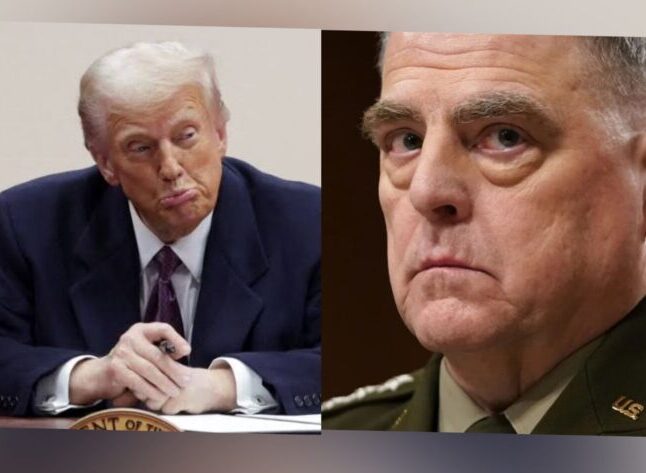In an extraordinary decision, Defense Secretary Pete Hegseth has rescinded both the security clearance and protective detail of Gen. Mark Milley, the former Chairman of the Joint Chiefs of Staff.
Pentagon spokesperson, John Ullyot, confirmed the move on Tuesday, marking an unprecedented step against the retired senior military officer who has frequently clashed with President Donald Trump.
Hegseth, who assumed office only two days ago, has also directed the Pentagon’s inspector general to initiate a formal inquiry into Milley’s “conduct” to determine whether an assessment of his military rank is warranted. The official statement did not elaborate on the nature of Milley’s alleged actions that might justify such a review.
Shortly after Trump’s inauguration last week, Pentagon officials took down Milley’s official portrait as Chairman of the Joint Chiefs, removing it from its designated display. However, as of Tuesday, another portrait from his tenure as Army Chief of Staff remained hanging inside the building.
Milley was initially appointed by Trump as the nation’s highest-ranking military officer in 2018. However, their relationship soured significantly during the final months of Trump’s initial presidency. At one point, Milley labelled Trump a “fascist,” and in his final address as Joint Chiefs Chair in 2023, he asserted that the military swear allegiance not to a “wannabe dictator,” a pointed remark widely interpreted as aimed at Trump.
Meanwhile, Trump has repeatedly accused Milley of treason over phone conversations the general had with his Chinese counterpart in 2020.
Trump had taken to social media, calling the calls “an act so egregious that, in times gone by, the punishment would have been DEATH!”
However, Milley has defended his actions, testifying that the conversations were coordinated with defense secretaries and national security officials at the time.
Additionally, Trump has faulted Milley for the chaotic withdrawal from Afghanistan, despite Milley’s opposition to the pullout.
Joe Kasper, Chief of Staff at the Department of Defense, defended the latest moves, stating, “Undermining the chain of command is corrosive to our national security, and restoring accountability is a priority for the Defense Department under President Trump’s leadership.”
On the morning of his departure from the White House, former President Joe Biden issued a sweeping pardon for Milley, shielding him from any legal consequences Trump might pursue. Biden justified the decision by highlighting Milley’s decades of military service, during which he was deployed “to some of the most dangerous parts of the world to protect and defend democracy.”
In response, Milley expressed gratitude, saying, “It has been an honour and a privilege to serve our great country in uniform for over four decades, and I will continue to keep faith and loyalty to our nation and Constitution until my dying breath.”
While Biden’s pardon prevents Milley from facing criminal or military prosecution, the newly ordered inspector general’s investigation could potentially result in a reduction of Milley’s rank should it uncover misconduct.
In a late-night purge last Friday, Trump dismissed inspectors general from over a dozen federal departments, including the Pentagon, bypassing the usual 30-day notice to Congress and offering no detailed justification.
Inspectors general are tasked with conducting audits and investigations into potential corruption, fraud, or misuse of government resources, with their offices designed to function autonomously.
Trump’s return to the presidency has already been marked by aggressive actions against former officials. As CNN previously reported, he has swiftly enacted political reprisals, making good on promises of retribution.
Within hours of taking office, Trump revoked the Secret Service protection assigned to his former National Security Adviser John Bolton, who had been receiving protection due to threats from Iran.
Former Secretary of State Mike Pompeo, who was under similar security due to Iranian threats, also had his details revoked. Additionally, Trump removed security coverage for Dr. Anthony Fauci, whose protection had been funded by the National Institutes of Health due to persistent threats stemming from his role during the COVID-19 pandemic.
(CNN)
ALSO READ TOP STORIES FROM NIGERIAN TRIBUNE







